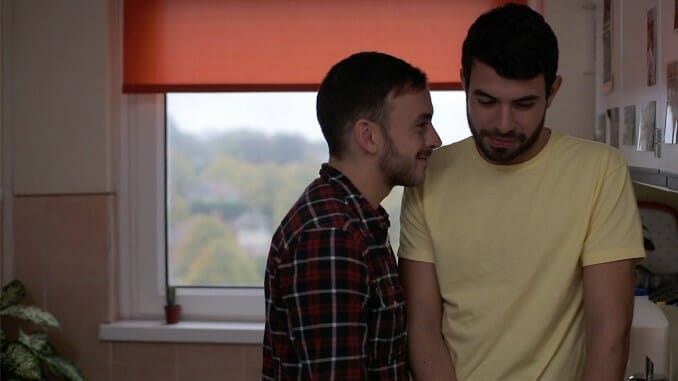I Can Hardly Remember Anything: Weekend at 10

“I can hardly remember anything,” Russell (Tom Cullen) stammers, Glen (Chris New) brandishing a tape recorder in his face. If ever there were a post-coital confrontation, it’s this. Not some Albee-esque argument about the corrosion beneath domestic bliss or the Bergmanesque, bleakly animated gape of a screaming silence from God, but a morning after undressing of the self. If Russell, who is more reticent about his identity, intended for this little hookup to be an escape—and who among us?—Glen, an artist provoking the boundaries of exactly what Russell fears, had other plans. “Just talk about last night. You know, what happened, what you wanted to happen,” Glen instructs. Dive into the memory of what you wanted and what happened and find the space in-between, where a part of yourself, fragile and strange and budding, may exist. Remember what could have been while it was happening. Filmmaker Andrew Haigh doesn’t dwell on the recorder, just on the words, the cobbled-together memories.
In 2011, when Haigh’s Weekend premiered at SXSW, it was still relatively novel for someone to reveal those parts of themselves publicly, art project or otherwise. Almost as exotic was a film about gay men that embedded sex seriously in their lives, shorn of a jokey crassness and stripped of the tragedy that not infrequently dogged such stories. Haigh’s film, without condescending to its gay audience or pandering to its straight one, could meditate on both gazes, making Glen’s proclamations about the kind of gay art that would garner an audience, particularly regarding the kinds of subjects people would engage with, emerge as meta-commentary. Weekend could be both a film about those confessions and emotional excavations while itself being a confession and excavation.
Playwright Tony Kushner wrote that, in sex, you’ll “swallow maybe a quart of someone’s spit.” But what else, besides the bodily fluids, are you drinking? Glen’s art project, which investigates the projections we make about ourselves and others before and during casual sex, is the opposite of escape; rather, it’s a direct encounter with as much yourself as the other person, and a dare to see how well you know yourself after all. Your wants and desires and fears. Your past and future. Your politics.
The art project, which Russell sheepishly concedes to doing, forces him to get lost in memory—but he doesn’t, not quite. He recounts the previous evening’s escapades with a degree of embarrassment and hesitance, which Glen can see. As Glen pushes him and tests the limits of his memory and his boundaries talking about sex, the truth wriggles out. Maybe when they were messing around, Glen was playing a little too hard, maybe this isn’t exactly the kind of encounter Russell wanted: “Sorry, Glen, if I don’t make your grade.” The tape recorder clicks stop.
Small and charcoal-colored, there’s an anachronistic quality to Glen waving about a little tape recorder as a secret-keeper designed to betray, especially as the two exchange cell phone numbers shortly after. It’s memory, a recent past, but contained in something tactile, in contrast to the way that Russell keeps his memories about sex organized on a diaristic word document on his computer.
But the memory and the history that effectively bore them is not so hermetically relegated to sex, and their history of sex is not so insular that it doesn’t contain other facets of their life. Embedded within the film is a political context: What is Weekend if not two men traversing their own sense of politics? While blurbs and short synopses may describe the film as two men discussing what it means to be gay, one would be remiss to forget that emotional and architectural gayness (in this film and, dare I say, in life) is charged with and borne of politics.
Their individual and collective responses and experiences with shame, their pointedly different approaches to the expression of their identity, and their respective considerations and contemplations of what gay happiness might look like (domestic or liberated) are shaped by a political landscape. LGBTQ rights have been and continue to be fraught. in the UK. The Civil Partnership Act of 2004 allowed LGBTQ couples to enter into partnerships that were similar, though not the same, as marriage; though submitted in 1957, the aims of the Wolfenden Report suggesting that sexual acts between consenting adults [21 and over] should not be criminalized, would not become law until the Sexual Offences Act 1967; and rights for and the dignity of transgender people continue to be at risk, especially in the last few years.
-

-

-

-

-

-

-

-

-

-

-

-

-

-

-

-

-

-

-

-

-

-

-

-

-

-

-

-

-

-

-

-

-

-

-

-

-

-

-

-








































